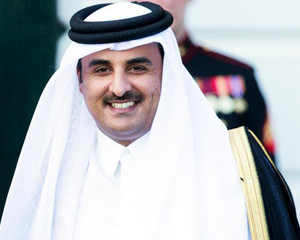Jeddah, May 28: Qatari Emir Sheikh Tamim bin Hamad Al-Thani has said his country enjoyed deep and historical ties with Iran.
In a phone conversation with Iranian President Hassan Rouhani on Saturday, Al-Thani said he wanted the ties with Iran to be “stronger than ever before.”
The remarks confirm lingering suspicions that have been swirling in the world media that Qatar was in league with Iran against its fellow Arab and Gulf countries. Iran is seen as the root cause of all the troubles in the Arab world — from Syria to Iraq, to Yemen and Lebanon.
Al-Thani said he will instruct the authorities in his country to exert all efforts to develop relations with Tehran. Rouhani stressed that one of Iran's foreign policy pillars is continuation of cooperation with Qatar.
In comments that will be seen as ironical, Rouhani said that sectarianism is a major scourge that affects everybody's security. Iran has vociferously and militarily promoted sectarianism in the Arab world through its armed militias.
Rouhani called for strengthening cooperation between the countries of the region to bring about stability and harmony.
While underlining the importance Iran pays to developing relations with neighboring countries, especially Qatar, the Iranian president expressed confidence in the possibility of doing away with obstacles to such ties through the strong will of all countries, particularly Iran and Qatar.
Iran, said Rouhani, seeks to spread a climate of moderation and logic in the relations among the region's countries, and gives priority to political solutions.
He added that the countries of the region need more consultation and exchange of ideas to resolve and contain regional challenges, and declared Iran's readiness to cooperate in this regard.
Saudi Arabia and the UAE expressed exasperation this week after official Qatar media published remarks purported to have been made by Sheikh Tamim, which were critical of Trump's foreign policy and of renewed tensions with Tehran.
Qatar said the remarks, published late on Tuesday, were fake and that the news agency that ran them had been hacked.





Comments
Add new comment